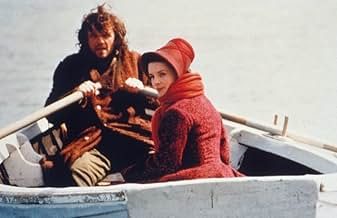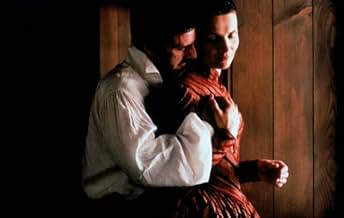PUNTUACIÓN EN IMDb
7,1/10
5,8 mil
TU PUNTUACIÓN
Añade un argumento en tu idiomaIn a small French colony, a drunken man kills someone. While a guillotine is being shipped in, he changes, becoming a good and popular man.In a small French colony, a drunken man kills someone. While a guillotine is being shipped in, he changes, becoming a good and popular man.In a small French colony, a drunken man kills someone. While a guillotine is being shipped in, he changes, becoming a good and popular man.
- Premios
- 3 premios y 9 nominaciones en total
Argumento
¿Sabías que...?
- CuriosidadesThe film was to be completely filmed on the island of Saint-Pierre, but when the snow failed to arrive, the production had to move further north to Newfoundland for certain sequences.
- PifiasWhen Neel is told he's strong enough to "ramer jusqu'au chez les Anglais", the English subtitles say "row over to Canada" rather than "row over to the English". This introduces an error: both the geography and the dialogue in other scenes make it clear that Newfoundland is meant, but Newfoundland wasn't part of Canada until 1949.
- ConexionesFeatured in The 58th Annual Golden Globe Awards 2001 (2001)
Reseña destacada
THE WIDOW OF ST.-PIERRE may not be a great film, but amidst a crop of mediocre current releases, it's a fine effort that boasts a hardworking cast, awesome costumes and sets, terrific cinematography and excellent direction. For those unlikely to stay in and read MOBY DICK, the combination of austere location, mid-19th-century maritime theme, and the Reaper looming o'er the ocean tides offers a satisfying divertissement on a cloudy Sunday afternoon.
Based on actual court records, the plot begins after a Parisian military captain, Jean (Daniel Auteuil), and his new wife, Madame La (Juliette Binoche), arrive on an isolated French isle off the coast of Newfoundland, where widows outnumber balmy days 50 to 1. One night, two blind-drunk men brutally knife a man to find out if he's `fat or just big.' The court sentences instigator Neel Auguste (Yugoslav director Emir Kusturica) to death by guillotine, `the widow,' in French parlance. But the remote fishing island does not possess the instrument of destruction that its French rulers dictate and must obtain a loaner from Martinique. While awaiting its arrival, the government locks Neel in a dark cell and entrusts him to the care of the Captain and Madame La.
An MSW waiting to happen, Madame has a weakness for `desperate cases.' She asks Neel to build her a greenhouse and tend her plants, a challenging request in this hardscrabble environment. As the Parisian belle negotiates her homesickness and the austerity of her surroundings by cultivating her garden, Neel confronts his own banishment from society and cultivates his compassion. This is one of several lovely parallelisms director Patrice Leconte teases out.
The sexual tension between Madame and Neel, though enacted subtly, is nevertheless palpable. During a reading lesson, their fingers brush while scanning a page. As Neel scarfs down her soup in a mildly bestial manner, she looks on lovingly. And when he asks her why she so nurtures him, she replies, `We change, whatever we do. I am sure of that.'
Meanwhile, the fisherfolks' tongues are wagging-ever cautioning Madame's loving husband about the duo's blossoming relationship. The Captain, however, venerates his wife's `humanism' and trusts her enough not to interfere. He is another wonderful character, both strong and sensitive, passionate in his love of his wife, unwilling to back down in his defense of their collective ideals.
Both Binoche and Kusturica prove more than equal to their roles. Binoche imbues her character with much more depth than that of Vianne in CHOCOLAT. With her limpid brown eyes and achingly empathic face, she elevates this personage to the level of classic tragic heroine. Kusturica, given a part that begs overacting, never wrings out our emotions, yet shows he possesses true remorse for his actions and a heart kinder still than that of his benefactors.
Most memorable is the set. Shot in Nova Scotia and Quebec, the film uses clapboard and stone buildings, often snow-salted, as an apt metaphor for the government's rigidity in refusing to commute Neel's sentence, despite his overwhelming popularity in the village as a doer of good deeds. Clearly the film excoriates capital punishment, with such dialogue as Madame's fervent cry, `They aren't punishing the same man they sentenced!'
This widow's walk proceeds at a leisurely pace, perhaps a mite too slowly for 21st-century attention spans. But overall, if you like a good, dark tragedy, pick a dreary night and go.
Based on actual court records, the plot begins after a Parisian military captain, Jean (Daniel Auteuil), and his new wife, Madame La (Juliette Binoche), arrive on an isolated French isle off the coast of Newfoundland, where widows outnumber balmy days 50 to 1. One night, two blind-drunk men brutally knife a man to find out if he's `fat or just big.' The court sentences instigator Neel Auguste (Yugoslav director Emir Kusturica) to death by guillotine, `the widow,' in French parlance. But the remote fishing island does not possess the instrument of destruction that its French rulers dictate and must obtain a loaner from Martinique. While awaiting its arrival, the government locks Neel in a dark cell and entrusts him to the care of the Captain and Madame La.
An MSW waiting to happen, Madame has a weakness for `desperate cases.' She asks Neel to build her a greenhouse and tend her plants, a challenging request in this hardscrabble environment. As the Parisian belle negotiates her homesickness and the austerity of her surroundings by cultivating her garden, Neel confronts his own banishment from society and cultivates his compassion. This is one of several lovely parallelisms director Patrice Leconte teases out.
The sexual tension between Madame and Neel, though enacted subtly, is nevertheless palpable. During a reading lesson, their fingers brush while scanning a page. As Neel scarfs down her soup in a mildly bestial manner, she looks on lovingly. And when he asks her why she so nurtures him, she replies, `We change, whatever we do. I am sure of that.'
Meanwhile, the fisherfolks' tongues are wagging-ever cautioning Madame's loving husband about the duo's blossoming relationship. The Captain, however, venerates his wife's `humanism' and trusts her enough not to interfere. He is another wonderful character, both strong and sensitive, passionate in his love of his wife, unwilling to back down in his defense of their collective ideals.
Both Binoche and Kusturica prove more than equal to their roles. Binoche imbues her character with much more depth than that of Vianne in CHOCOLAT. With her limpid brown eyes and achingly empathic face, she elevates this personage to the level of classic tragic heroine. Kusturica, given a part that begs overacting, never wrings out our emotions, yet shows he possesses true remorse for his actions and a heart kinder still than that of his benefactors.
Most memorable is the set. Shot in Nova Scotia and Quebec, the film uses clapboard and stone buildings, often snow-salted, as an apt metaphor for the government's rigidity in refusing to commute Neel's sentence, despite his overwhelming popularity in the village as a doer of good deeds. Clearly the film excoriates capital punishment, with such dialogue as Madame's fervent cry, `They aren't punishing the same man they sentenced!'
This widow's walk proceeds at a leisurely pace, perhaps a mite too slowly for 21st-century attention spans. But overall, if you like a good, dark tragedy, pick a dreary night and go.
- utzutzutz
- 30 abr 2001
- Enlace permanente
Selecciones populares
Inicia sesión para calificar y añadir a tu lista para recibir recomendaciones personalizadas
- How long is Widow of St. Pierre?Con tecnología de Alexa
Detalles
- Fecha de lanzamiento
- Países de origen
- Sitio oficial
- Idioma
- Títulos en diferentes países
- Widow of St. Pierre
- Localizaciones del rodaje
- Fortress of Louisbourg, Louisbourg, Nueva Escocia, Canadá(as Saint-Pierre)
- Empresas productoras
- Ver más compañías en los créditos en IMDbPro
Taquilla
- Presupuesto
- 100.000.000 FRF (estimación)
- Recaudación en Estados Unidos y Canadá
- 3.193.889 US$
- Fin de semana de estreno en EE. UU. y Canadá
- 31.702 US$
- 4 mar 2001
- Recaudación en todo el mundo
- 7.193.889 US$
- Duración1 hora 52 minutos
- Color
- Mezcla de sonido
- Relación de aspecto
- 2.35 : 1
Contribuir a esta página
Sugerir un cambio o añadir el contenido que falta

Principal laguna de datos
By what name was La viuda de Saint-Pierre (2000) officially released in India in English?
Responde































